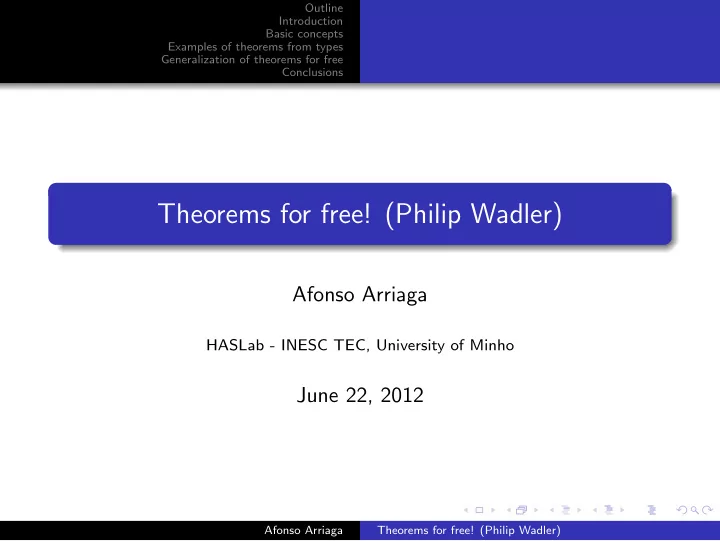

Outline Introduction Basic concepts Examples of theorems from types Generalization of theorems for free Conclusions Theorems for free! (Philip Wadler) Afonso Arriaga HASLab - INESC TEC, University of Minho June 22, 2012 Afonso Arriaga Theorems for free! (Philip Wadler)
Outline Introduction Basic concepts Examples of theorems from types Generalization of theorems for free Conclusions Introduction 1 Basic concepts 2 Examples of theorems from types 3 Generalization of theorems for free 4 Conclusions 5 Afonso Arriaga Theorems for free! (Philip Wadler)
Outline Introduction Basic concepts Examples of theorems from types Generalization of theorems for free Conclusions Introduction “Based on the concept of relational parametricity (Reynolds 1983), Wadler (1989) established so-called ‘free theorems’, a method for obtaining proofs of program properties from parametrically polymorphic types in purely functional languages.” (Daniel Seidel and Janis Voigtlander, 2011) Afonso Arriaga Theorems for free! (Philip Wadler)
Outline Introduction Basic concepts Examples of theorems from types Generalization of theorems for free Conclusions Basic concepts What is a parametrically polymorphic function? It’s a function whose type signature allows various arguments to take on arbitrary types, but the types must be related to each other in some way. Afonso Arriaga Theorems for free! (Philip Wadler)
Outline Introduction Basic concepts Examples of theorems from types Generalization of theorems for free Conclusions Basic concepts Why parametric polymorphism? Because... it allows code to be reused. we can derive useful theorems. type-agnostic reasoning is better! Afonso Arriaga Theorems for free! (Philip Wadler)
Outline Introduction Basic concepts Examples of theorems from types Generalization of theorems for free Conclusions Example 1 - Reverse Let r be a function of type: r :: forall x . [ x ] → [ x ] Take any total function f :: a → b for concrete types a and b . For example, suppose f = ord . ord :: Char → Int f = ord It is possible to conclude that: map f . r char ≡ r int . map f Afonso Arriaga Theorems for free! (Philip Wadler)
Outline Introduction Basic concepts Examples of theorems from types Generalization of theorems for free Conclusions Example 2 - Head Let h be a function of type: h :: forall x . [ x ] → x Take any total function f :: a → b for concrete types a and b . It is possible to conclude that: map f . h a ≡ h b . map f Afonso Arriaga Theorems for free! (Philip Wadler)
Outline Introduction Basic concepts Examples of theorems from types Generalization of theorems for free Conclusions Example 3 - Zip Let z be a function of type: z :: forall x , y . [ x ] → [ y ] → [( x , y )] Take any total function f :: a → a ′ and g :: b → b ′ for concrete types a , a ′ , b and b ′ . Commutative diagram: zip AB [ AxB ] < [ A ] x [ B ] map ( f x g ) ( map f ) x ( map g ) ∨ ∨ < zip A ′ B ′ [ A ′ xB ′ ] [ A ′ ] x [ B ′ ] Afonso Arriaga Theorems for free! (Philip Wadler)
Outline Introduction Basic concepts Examples of theorems from types Generalization of theorems for free Conclusions Generalization of theorems for free F and G are functors φ is a natural transformation from F to G . φ G A < F A G f F f ∨ ∨ φ G B F B < Afonso Arriaga Theorems for free! (Philip Wadler)
Outline Introduction Basic concepts Examples of theorems from types Generalization of theorems for free Conclusions Conclusions For every function f :: F a → F a and for every choice of g :: x → y , with x and y concrete types, it holds that: f y . Fmap g ≡ Fmap g . f x Reading types as relations is the key to derive other theorems from types, such as for higher-order functions sort and fold . Automatic generation of free theorems http://www-ps.iai.uni-bonn.de/cgi-bin/free-theorems- webui.cgi Afonso Arriaga Theorems for free! (Philip Wadler)
Outline Introduction Basic concepts Examples of theorems from types Generalization of theorems for free Conclusions Thank you! Afonso Arriaga Theorems for free! (Philip Wadler)
Recommend
More recommend